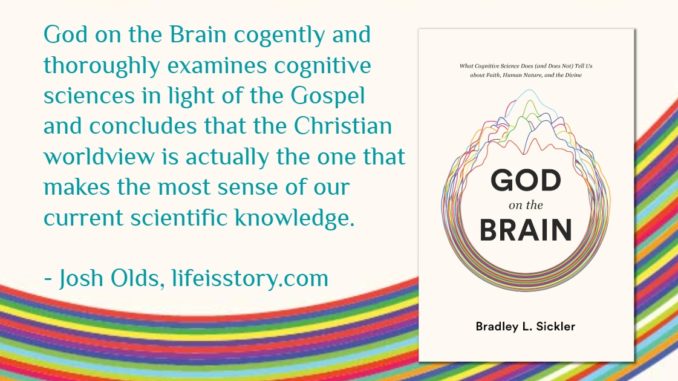
Published by Crossway Books on July 21, 2020
Genres: Academic
Buy on Amazon
Goodreads

Advances in modern science have dramatically increased our understanding of the human brain.
While this progress has helped improve many lives, it has also raised many philosophical and theological questions. Researchers are increasingly presenting the brain as comprising the totality of a person. But is this a fair assessment?
Bradley Sickler offers a timely theological, scientific, and philosophical analysis of cognitive science, arguing that the brain is more complex than what can be explained by science alone. Navigating questions about the brain, religion, and science, Sickler guides readers to confidently affirm that the Christian worldview offers the most compelling vision of the true nature of humanity.
God on the Brain is a heavy read. Of course, the subtitle: What Cognitive Science Does (and Does Not) Tell Us about Faith, Human Nature, and the Divine could have told you that. As humans have learned more about themselves, we have often mistaken the knowledge of how something works with the knowledge of why it works or how it began. If we understand it, then it can’t be of God. Dr. Bradley Sickler debunks that theory, showing us how these advances in brain science actually go a long way to connecting us to our Creator.
I want to be clear from the outset that I would consider this an academic book. It’s chock full of references and scientific quotes. I’m a theologian, not a scientist, and there were a few times I had to pause my reading and open Wikipedia or some other resource to more fully understand what was being said. The early chapters focus on the connection between science and Christianity. These are important chapters because many Christians often downplay the validity of science and science sometimes downplays the validity of Christianity. Sickler shows how the two work together to reveal God and his world to us.
The next set of chapters tells with mind-body integration and arguments for the existence of the soul. This is important because, without a soul there is little to nothing that separates man from the rest of creation. Sickler deftly moves through a few different arguments against the soulishness of man, showing their insufficiencies and highlighting how the spiritual and material could work together.
Overall, God on the Brain cogently and thoroughly examines cognitive sciences in light of the Gospel and concludes that the Christian worldview is actually the one that makes the most sense of our current scientific knowledge. While this book is difficult to read at times—it’s probably best suited for a philosophy class—I would encourage lay readers who are dismissive of modern science as anti-God to read this and see how science can uphold the Scriptural view of humans as both spiritual and physical.
